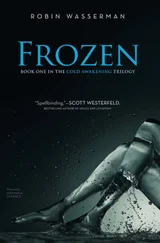Robin Wasserman - Sloth
Здесь есть возможность читать онлайн «Robin Wasserman - Sloth» весь текст электронной книги совершенно бесплатно (целиком полную версию без сокращений). В некоторых случаях можно слушать аудио, скачать через торрент в формате fb2 и присутствует краткое содержание. Жанр: Детская проза, на английском языке. Описание произведения, (предисловие) а так же отзывы посетителей доступны на портале библиотеки ЛибКат.
- Название:Sloth
- Автор:
- Жанр:
- Год:неизвестен
- ISBN:нет данных
- Рейтинг книги:4 / 5. Голосов: 1
-
Избранное:Добавить в избранное
- Отзывы:
-
Ваша оценка:
- 80
- 1
- 2
- 3
- 4
- 5
Sloth: краткое содержание, описание и аннотация
Предлагаем к чтению аннотацию, описание, краткое содержание или предисловие (зависит от того, что написал сам автор книги «Sloth»). Если вы не нашли необходимую информацию о книге — напишите в комментариях, мы постараемся отыскать её.
Adam's done. With love, with school…with everything. Done.
Beth's doing her best to act "normal," but even Reed recognizes devastation, since all he does is fantasize about Kaia.
Miranda's lost too.
Did she ever really forgive Harper?
Only Kane is actually doing something: uncovering how the crash happened – and why.
But there's no do-over with death.
There's only moving on – to the most unlikely places…
Sloth — читать онлайн бесплатно полную книгу (весь текст) целиком
Ниже представлен текст книги, разбитый по страницам. Система сохранения места последней прочитанной страницы, позволяет с удобством читать онлайн бесплатно книгу «Sloth», без необходимости каждый раз заново искать на чём Вы остановились. Поставьте закладку, и сможете в любой момент перейти на страницу, на которой закончили чтение.
Интервал:
Закладка:
She looked up at the sound of a knock on the door. Before she had a chance to come up with a cover story or consider hiding, the door swung open, and Beth was momentarily relieved to realize that it wasn’t a teacher who might demand an explanation for Beth’s presence. But her relief was short-lived, as a dour-looking woman with a squarish build, coffee-colored skin, and a pinched, vaguely familiar face stepped into the room-followed by a reluctant Harper Grace.
“I was told this room would be empty,” the woman said, her words clipped and precise. “You’ll have to go.”
The woman sat down on one of the desks and, without bothering to check that Beth would follow her command, focused her attention on Harper.
“I should get back to class,” Harper mumbled, still standing in the doorway. Beth had to push past her to get out of the room, a maneuver made more difficult by the fact that Harper didn’t edge out of the way, but instead just stood planted in the middle of the doorway.
“Come in, sit down,” the woman said, and though her voice was soft, it was far from kind. “You said you needed to talk to me-here I am.”
Harper glanced toward Beth for the first time, and Beth recoiled from the look in her eyes, a confusing mixture of Get out and, more disturbingly, Stay. Beth quickened her step. She shut the door behind her, just slowly enough to hear the woman’s final words.
“So, what did you remember about the accident?”
She just had to come to school today. She couldn’t be bothered to tend to the elderly or wipe the brows of the sick-and apparently, this was her punishment. Detective Wells was perched on the edge of one of the desks, while Harper had squeezed herself into a seat, feeling oddly constrained by the metal rod and flat, narrow desk that wrapped around and held her in place. When they called her out of class, she should have known what was coming, but she’d somehow fooled herself into thinking that Wells was a problem that, if ignored, would go away. Not forever, she’d promised herself, screening the latest of the calls, but just long enough that Harper could have a chance to figure out what she was going to do.
Apparently Detective Wells was working on her own timeline.
“I really don’t remember what happened,” Harper said uncomfortably. The detective’s gaze was making her skin crawl, but the alternative views weren’t much better. Whoever usually used this classroom had papered the walls with portraits of historical courage-Martin Luther King, Jr., FDR, Rosa Parks, Winston Churchill (she only recognized that one thanks to the oversize caption)-face after face staring down at her with solemn expectation. All she needed was a big painting of Honest Abe to remind her that some people “cannot tell a lie.” (Or was it George Washington who’d chopped down his cherry tree and then needlessly confessed? Harper could never remember, but she’d always thought that, in the same position, she would have gorged herself on cherries and then enjoyed a sound sleep in the log cabin without giving her sticky red ax a second thought.)
“You left me a message, Harper, saying that you’d remembered something ” A ridge of wrinkles spread across the detective’s forehead. “I don’t know why you wouldn’t want to help us out, unless-”
“It’s just hard,” Harper said quickly. Shut up, she told FDR’s accusing stare. At least that’s true . “You know, talking about… what happened.” After struggling for weeks to maintain a mask of contentment, it was tough to make an abrupt shift to visible vulnerability. But Harper didn’t know how else to slow things down.
It worked.
“Just take your time,” Detective Wells suggested. She leaned forward. “Anything you remember might help us, even if it seems inconsequential.”
Harper took a breath and opened her mouth, then shut it again, stalling for time. You don’t know anything , Kane had said. She wanted to believe him. “I remembered… I thought I remembered that the car that hit us was… white.”
The detective whipped out a notebook and favored Harper with a wide smile. “That’s great-anything else?”
“But then, the next night, I had another dream, and the car was black. I guess it was just a dream. Not, you know, a memory,” Harper added, wondering if Grace cops got trained in spotting liars. Detective Wells didn’t seem much like a human polygraph machine, but you could never tell. “That’s why I was, uh, avoiding your calls. I was embarrassed to waste your time.”
“It’s not a waste,” the detective assured her, without bothering to suppress a disappointed sigh. She shut the notebook and stuffed it back into her bag. “You thought you could help, and you did the right thing. No need to be embarrassed about that.”
“So…” She wasn’t sure she actually wanted to know. “Do you have any leads?” Did they even use that word in real life? she wondered. “You know, about what happened? I mean, the other car?”
She shook her head. “We haven’t been able to match the paint samples-the van was red, by the way.”
“Oh.” She wondered why no one had told her that before. She tried to imagine a red van speeding toward her and tried to picture her hands on the wheel, jerking away; but visualization exercises were tough to do when you had to keep your eyes open and smile at a cranky detective.
“We’ve ascertained that both vehicles were speeding, and that the collision took place on your side of the road, which implies that the driver of the other vehicle may have strayed into your lane, but I’m afraid that’s all we know. So far, of course.”
“Of course,” Harper repeated, although judging from Detective Wells’s hopeless and impersonal tone, she guessed that no one really expected to learn much more. “But if you ever did find the guy…?”
“Hit-and-run is a very serious crime,” the detective said, looking up at the posters lining the wall. “He or she would be punished to the fullest extent of the law.” She scratched the side of her neck, visibly uncomfortable with what she had to say next. “Look, I know it can be difficult, after a traumatic event like this-especially when no one’s taken responsibility, and you have no one to blame. There are people you can talk to, if-”
“I’m fine,” Harper half shouted. “Can I go back to class now?”
“Sure. Of course. Thanks for speaking with me.”
“Sorry you had to come out here for nothing.” As Detective Wells shook her hand and headed for the door, Harper could feel her split-second decision hardening into reality. She could still tell the truth-catch the detective before she walked out the door and explain everything- but then the door shut, and the moment had passed.
These are the things I know , Harper told herself.
1. No one knew she was driving, and Kane would never tell.
2. If the van had been in the wrong lane, the accident would have happened anyway, no matter who was driving.
3. Kaia was dead, and she would stay that way, no matter what anyone did.
4. Kaia didn’t believe in self-sacrifice.
That left plenty of gaping holes. She didn’t know where she’d gotten the drugs from, or why she had taken them. She didn’t know why she and Kaia were on the road in the first place, or where they were going. She didn’t know whose fault the accident was, not really, though she could pretend that she did. She didn’t know if she believed in Hell, so she obviously didn’t know if she’d end up there. And she didn’t know if she could live with herself-with what she knew and what she didn’t-in the meantime.
I have to , she told herself. And I will. She looked again at the posters-JFK, Gandhi, Anne Frank, Charles Lindbergh. They must have been from a set made specially for irony-deficient high school teachers, because they all bore some cheesy-beyond-belief quote designed to inspire students.
Читать дальшеИнтервал:
Закладка:
Похожие книги на «Sloth»
Представляем Вашему вниманию похожие книги на «Sloth» списком для выбора. Мы отобрали схожую по названию и смыслу литературу в надежде предоставить читателям больше вариантов отыскать новые, интересные, ещё непрочитанные произведения.
Обсуждение, отзывы о книге «Sloth» и просто собственные мнения читателей. Оставьте ваши комментарии, напишите, что Вы думаете о произведении, его смысле или главных героях. Укажите что конкретно понравилось, а что нет, и почему Вы так считаете.












